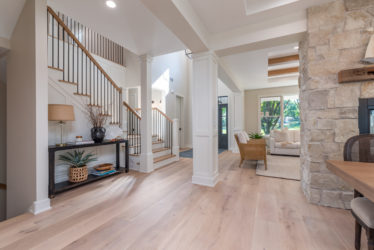When it comes to flooring options, homeowners have many choices available to them. Two popular options are wood flooring and luxury vinyl flooring. While both options have their advantages and disadvantages, understanding the differences between the two can help homeowners make an informed decision about which type of flooring is best for their home.
Wood Flooring
Wood flooring has been a popular choice for centuries, and it continues to be a popular option today. There are generally two different types of wood flooring, solid and engineered, though there are hundreds of varying species and styles.
Solid hardwood flooring is made from a single piece of ¾” wood in a variety of different species. Solid wood generally should not be wider than 5” to avoid the plank becoming unstable due to humidity changes. This type of flooring can be seen as being more expensive but that is not always the case. What increases the price of wood isn’t always the thickness, but the rarity of the species and the process it takes to complete the finishing. Solid wood is a classic option that gives you the longest-lasting wood flooring for your home.

Engineered hardwood flooring is made from layers of wood that vary in its core. Generally, you will have different thicknesses on the top layer which is the true wood species, and a core of engineered plywood, OSB, or HDF among others. Some thicker and wider flooring can have what is called a balancing layer on the bottom to give the floor added stability as it will move around much more than others. These layers are then glued together in a way that will provide more stability in their movement to allow for wider planks. This is why you can go wider than 5” only in an engineered construction.
Luxury Vinyl Flooring
Luxury vinyl flooring, also known as LVT or LVP, is a newer flooring option that has become increasingly popular in recent years. This type of flooring is made from several layers of vinyl, a core of wood or stone composite, and PVC, and is designed to look like real wood or stone.

One of the main advantages of luxury vinyl flooring is its durability. It is resistant to scratches, stains, and dents, making it an ideal option for high-traffic areas in a home. Luxury vinyl flooring is also water resistant, which makes it a great option for bathrooms and kitchens.
Another advantage of luxury vinyl flooring is its versatility. It generally will have an underlayment attached with a click lock system and a thinner profile than most other flooring options. This allows the flooring to float over nearly any level surface, allowing you the option to keep your existing floor without tearing it out.
Differences Between Wood Flooring and Luxury Vinyl Flooring
While both wood flooring and luxury vinyl flooring have their advantages, there are some key differences between the two that homeowners should consider when making their decision.
Appearance: One of the main differences between wood flooring and luxury vinyl flooring is their appearance. Wood flooring offers a natural and warm look that can add character and value to a home. Luxury vinyl flooring, on the other hand, is designed to look like wood but is not a natural material. While luxury vinyl flooring has come a long way in terms of its appearance, it may not offer the same level of authenticity as real wood flooring.
Durability: Both wood flooring and luxury vinyl flooring are durable, but they offer different levels of resistance to wear and tear. Wood flooring is susceptible to scratches, dents, and stains, but it can be refinished to restore its appearance. Luxury vinyl flooring, on the other hand, is resistant to scratches, dents, and stains, making it a great option for high-traffic areas in a home.
Water Resistance: Wood flooring is not water-resistant, which means that it is not recommended for use in bathrooms or laundry rooms where moisture is present. Luxury vinyl flooring, on the other hand, is water-resistant, making it an ideal option.
Cost: Wood flooring is typically more expensive than luxury vinyl flooring. Wood flooring is a natural surface that takes much more processing in terms of gathering the raw material than luxury vinyl it can be easily replicated. Wood will give you much more in terms of longevity than vinyl flooring as you can make repairs and refinish. Because of these differences, wood flooring typically will be slightly higher than your average vinyl flooring. You will also need to consider the cost of maintenance as well as this can factor into your investment in the long run. While wood is a higher value, vinyl when needed to be repaired can be much less expensive as well.
Installation: Both wood flooring and luxury vinyl flooring can be installed as a floating floor, which means that they are not attached to the subfloor. However, wood flooring can also be nailed or glued down to the subfloor.
Maintenance: Wood flooring requires regular maintenance, including sweeping/vacuuming, mopping, and occasional refreshing if you have an oil finish floor. Every 10-15 years on average, you can expect a refinish or topcoat renewal which can take a couple of days out of your home. Luxury vinyl cannot be refinished and takes regular maintenance of sweeping/vacuuming and mopping.
Environmental Impact: Wood flooring is a natural material and can be a sustainable flooring option when sourced from responsibly managed forests. Wood is a useful material in all aspects from its core lumber to its sawdust, so nothing is wasted in the process. Luxury vinyl flooring is made from synthetic materials and is not biodegradable, which may be a concern for environmentally conscious homeowners.
Conclusion
When it comes to choosing between wood flooring and luxury vinyl flooring, there is no right or wrong answer. It ultimately comes down to personal preference and the needs of your home. If you value a natural and authentic look and are willing to invest in maintenance and care, then wood flooring may be the right choice for you. If durability, versatility, and water resistance are top priorities, then luxury vinyl flooring may be a better fit. Ultimately, the best way to make a decision is to weigh the pros and cons of each option and choose the one that best fits your lifestyle and budget.
